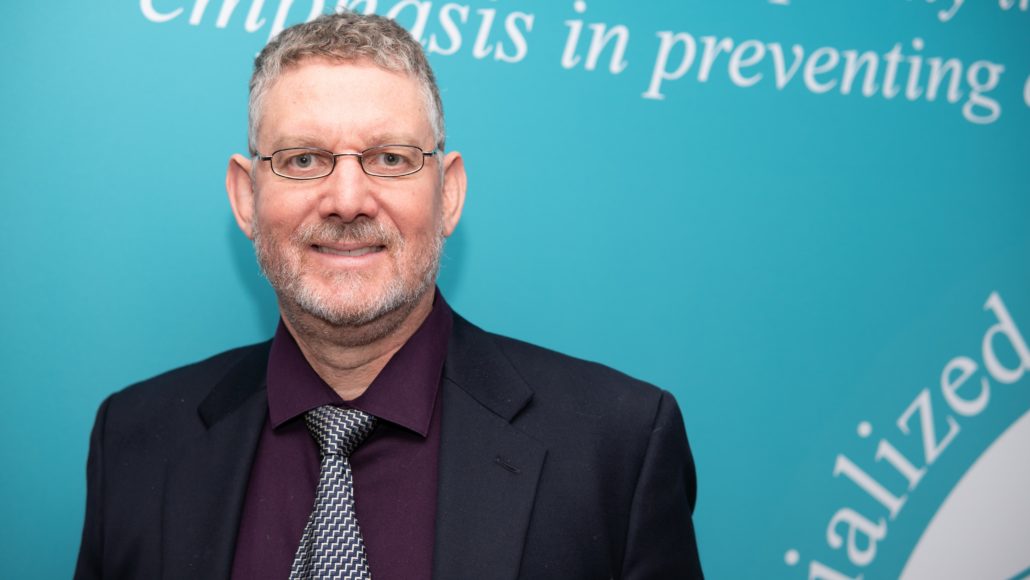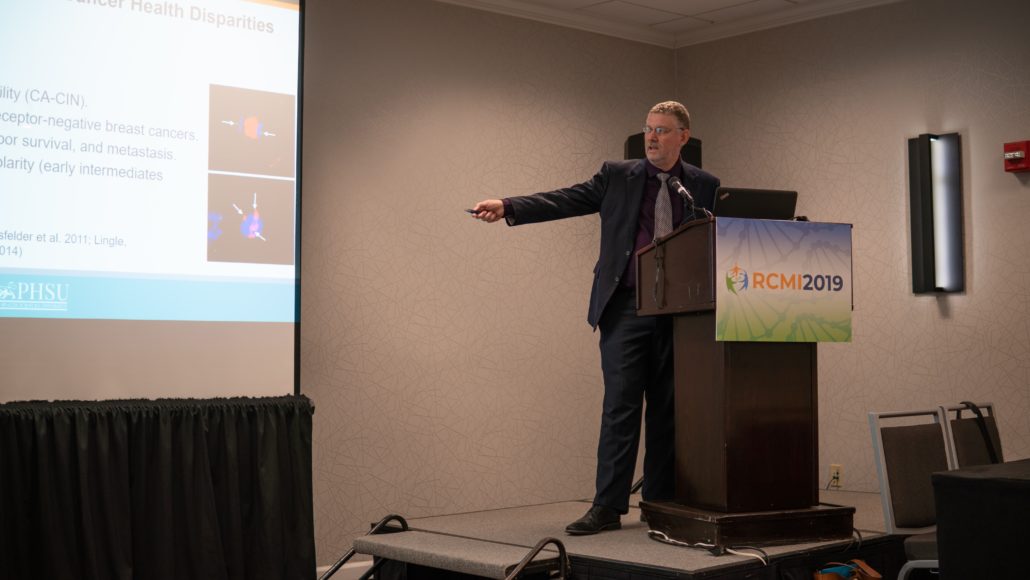In Collaboration with Moffitt Cancer Center in Florida, Researcher from PHSU’s Ponce Research Institute Receives $2.5 M Grant from the National Cancer Institute
They will study a potential new treatment for breast cancer in Hispanics/Latinas
The National Cancer Institute awarded a $2.5 M grant to a team of researchers led by Dr. Harold I. Saavedra, Ph.D., Professor of the Department of Basic Sciences, Program of Pharmacology at the Ponce Health Sciences University (PHSU), in collaboration with the Moffitt Cancer Center (MCC) in Tampa, Florida.
Other research team members include Drs. Julie Dutil, Ph.D. (PHSU), and Steven Eschrich, Ph.D. (MCC), who are experts on how ancestry influences breast cancer outcomes. Also on the team are Dr. Doug Cress, Ph.D. (MCC), an expert in cancer health disparities in Hispanics/Latinas; Dr. Quincy Mo (MCC), an expert in bioinformatics and biostatistician; and Drs. Marilin Rosa, M.D. (MCC), an expert in breast cancer pathology, and Dr. Roberto Díaz, M.D., Ph.D. (MCC), clinical consultant.
This grant will be used to research a potential new treatment for breast cancer in Hispanic/Latinas, particularly Puerto Rican, by observing a process that occurs at the cellular level, the centrosome-mitotic kinases, where centrosomal abnormalities can lead to a wide range of human diseases, including cancer.
“Our research is based on observations that centrosome-specific kinases are specifically dysregulated in Hispanic/Latinas, possibly leading to higher rates of breast cancer mortality in women of African descent than in non-Hispanic white women. That subtype of cancer tends to relapse and metastasize after chemotherapy and surgery,” explained Dr. Saavedra.

While this isn’t the only determining factor, it has been documented, that women from Puerto Rico, like African American women and women from West Africa, have higher probabilities of being detected with triple-negative breast cancer (a highly aggressive breast cancer subtype), for which there are no biological therapies available.
“The poor prognosis and mortality are in part due to socioeconomic factors and biological reasons, including the detection of breast cancers at later stages, of larger tumors, and higher rates of triple-negative breast cancers,” said Dr. Saavedra.
Therefore, the research team is looking to answer whether it’s possible to develop a novel biological therapeutic approach against this breast cancer subtype, particularly in African descendants, by modifying the tumor growth and its metastatic potential.
The MCC-PHSU U54 partnership would like to thank the Puerto Rico Science Trust and the Ponce Research Institute for providing multiple funds that allowed this grant to happen. For more information on the basis for this research, visit PubMed.gov, a page of the National Library of Medicine of the National Center for Biotechnology Information.
Ponce Health Sciences University is a university focused on the disciplines of Medicine, Clinical Psychology, Biomedical Sciences, Public Health and Nursing. Since 1977, it has developed highly trained professionals in the field of health care. Its educational center in Santurce, offers a Masters in Medical Sciences, a Masters in School Psychology and a Doctorate in Clinical Psychology. It also has a campus in St. Louis, MO.

Español
Investigador del Ponce Research Institute de PHSU, en colaboración con el Moffitt Cancer Center en Florida, recibe subvención de $2.5 millones del Instituto Nacional de Cáncer
Estudiarán un potencial nuevo tratamiento para el cáncer de seno en hispanas/latinas
El Instituto Nacional de Cáncer otorgó una subvención de $2.5 millones a un equipo de investigadores científicos liderado por el Dr. Harold I. Saavedra, Ph.D., profesor del Departamento de Ciencias Básicas y Programa de Farmacología de Ponce Health Sciences University (PHSU), en colaboración con investigadores del Moffitt Cancer Center (MCC) en Tampa, Florida.
Otros miembros del equipo de científicos incluyen a los doctores Julie Dutil, Ph.D. (PHSU), y Steven Eschrich, Ph.D. (MCC), expertos en cómo la ascendencia influye en los resultados del cáncer de seno. También componen el equipo el Dr. Doug Cress, Ph.D. (MCC), experto en desigualdades de salud y cáncer en mujeres hispanas/latinas; el Dr. Quincy Mo (MCC), experto en bioinformática y bioestadístico; la Dra. Marilin Rosa, M.D. (MCC), experta en patología de cáncer del seno y Roberto Díaz, M.D., Ph.D. (MCC), consultor clínico.
Esta subvención se utilizará para investigar un potencial nuevo tratamiento para el cáncer de seno en mujeres hispanas/latinas, particularmente puertorriqueñas, observando un proceso que ocurre a nivel celular, la quinasa mitótica del centrosoma, donde anormalidades centrosomales pueden causar una amplia gama de enfermedades en humanos, incluyendo cáncer.
“Nuestra investigación está basada en observaciones de que la quinasa mitótica del centrosoma está específicamente desregulada en las mujeres hispanas/latinas, lo cual posiblemente resulta en tasas más alta de mortalidad relacionadas al cáncer de seno en mujeres de ascendencia africana, que en mujeres blancas no-hispanas. Ese subtipo de cáncer tiende a reincidir y a propagarse luego de la quimioterapia y la cirugía”, explicó el Dr. Saavedra.
Aunque este no es el único factor determinante, se ha documentado que las mujeres puertorriqueñas, al igual que las mujeres afroamericanas y del oeste de África, tienen más probabilidades de que se les detecte cáncer de seno triple negativo (un subtipo de cáncer de seno altamente agresivo) para el cual no hay terapias biológicas disponibles.
“La pobre prognosis y mortalidad se deben en parte a factores socioeconómicos y razones biológicas, incluyendo la detección del cáncer del seno en etapas más tardías, de tumores más grandes, y de tasas más altas de cáncer de seno triple negativo”, dijo el Dr. Saavedra.
Por tanto, el equipo de investigadores está buscando responder si es posible desarrollar un método terapéutico biológico, novel, para tratar este subtipo de cáncer, particularmente en descendientes de la raza africana, modificando el crecimiento del tumor y su potencial de metástasis.
La alianza MCC-PHSU U54 desea agradecer al Puerto Rico Science Trust y al Ponce Research Institute por proveer fondos que permitieron que esta subvención ocurriera. Para más información sobre las bases de esta investigación visite PubMed.gov, una página del National Library of Medicine of the National Center for Biotechnology Information.
Ponce Health Sciences University es una universidad enfocada en las disciplinas de Medicina, Psicología Clínica, Ciencias Biomédicas, Salud Pública y Enfermería. Desde el 1977, han desarrollado profesionales altamente capacitados en el campo del cuidado de la salud. Su centro educativo en Santurce ofrece una maestría en Ciencias Médicas, maestría en Psicología Educativa y un doctorado en Psicología Clínica. También cuenta con un campo en St. Louis, MO.


